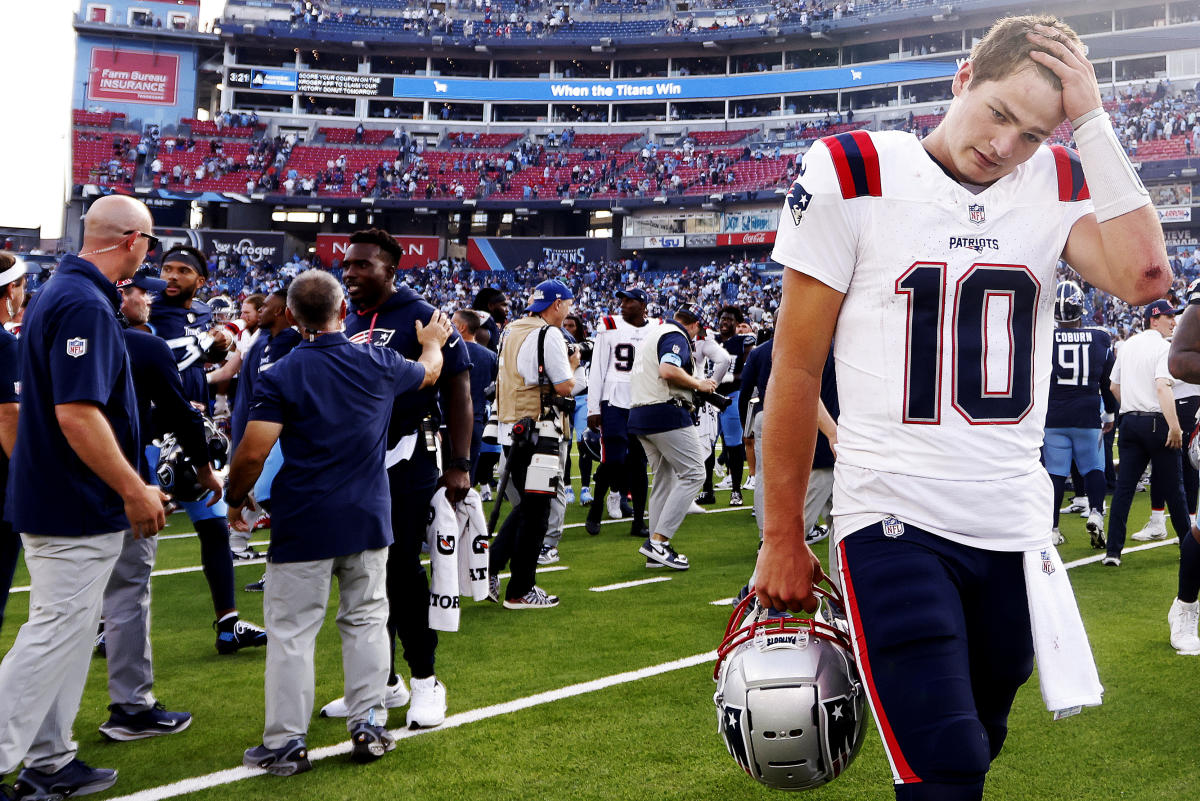What’s more fun than second-guessing NFL coaches? Nothing, that’s what. So let’s do it every week, right here. Today: Go for the win or play for overtime?
The scenario: Down 17-10 to Tennessee, New England’s Drake Maye executed one of the finest plays of the year, a no-time-left touchdown to draw within a single point of the Titans:
Spectacular, right? But now the Patriots and head coach Jerod Mayo faced a choice: kick an extra point and go to overtime, or go for 2 and, hopefully, get out of Nashville with an upset win?
Which way do you go? And make your decision quickly, because New England didn’t have any timeouts, and you don’t either.
The case for an extra point: Kicking was definitely the safer play. Maye said after the game that he was exhausted from running around on that final play. “Shoot, I was just trying to catch my breath,” he said. “I couldn’t even think about [a 2-point conversion]. I think just looking back on it, it’s easy to say. We were out there that long on such a high-intensity drive.”
Not only that, New England’s run game was absolutely wretched. Outside of Maye’s scrambling, the Patriots had 15 total rushing yards on Sunday. No, that’s not a typo. FIFTEEN. Combine that with an exhausted offensive line, and you’re at least giving everyone a chance to catch their breath before overtime.
Analytics don’t necessarily favor the Patriots here. FiveThirtyEight calls the decision to go for 2 while down a point a toss-up. Teams with bad offenses convert about 40 percent of their 2-point attempts, and you’ve got to figure that number is even lower for bad and exhausted offenses.
The case for going for 2: Tennessee was exhausted, too, and also dealing with the fact that they’d just given up a potential game-losing drive to a rookie who’s played all of five games. When you’ve got the opponent knocked down, you don’t give them a chance to catch their breath. That’s more of a motivational, vibes-based approach than a statistically minded one, true, but sometimes you go with your head and sometimes you go with your gut.
The decision: The Patriots opted for the extra point and overtime. Mayo defended his decision after the game, perhaps allowing that he listens a bit too much to the critics.
“Earlier in the season we went for 2 and didn’t get it. You get criticized. Kick the [extra point] here and you get criticized. I’ll always do what I think is best for the team,” he said. “We can talk about analytics and we do use those things, but at the same time, there is also a flow to the game.”
So he went with flow over flow charts. How’d that turn out for him?
The result: In overtime, Tennessee took the ball and burned nearly 75 percent of the time off the clock in a drive that led to a field goal. New England got the ball back with just over 2:30 remaining, which would have necessitated a second straight all-or-nothing drive out of Maye. This time, he wasn’t up to the task; just three plays in, he slung a pass into double coverage that was easily intercepted, ending the game.
This was not exactly Godzilla vs. Kong; this was one-win Tennessee against two-win New England. The only thing these two teams were playing for was pride. The Patriots will have that massive touchdown play to remember, but that might end up being one of the few fond memories of this season.
So. Your call. Should New England have gone for 1 and overtime, or 2 and the win?
EMEA Tribune is not involved in this news article, it is taken from our partners and or from the News Agencies. Copyright and Credit go to the News Agencies, email news@emeatribune.com Follow our WhatsApp verified Channel



